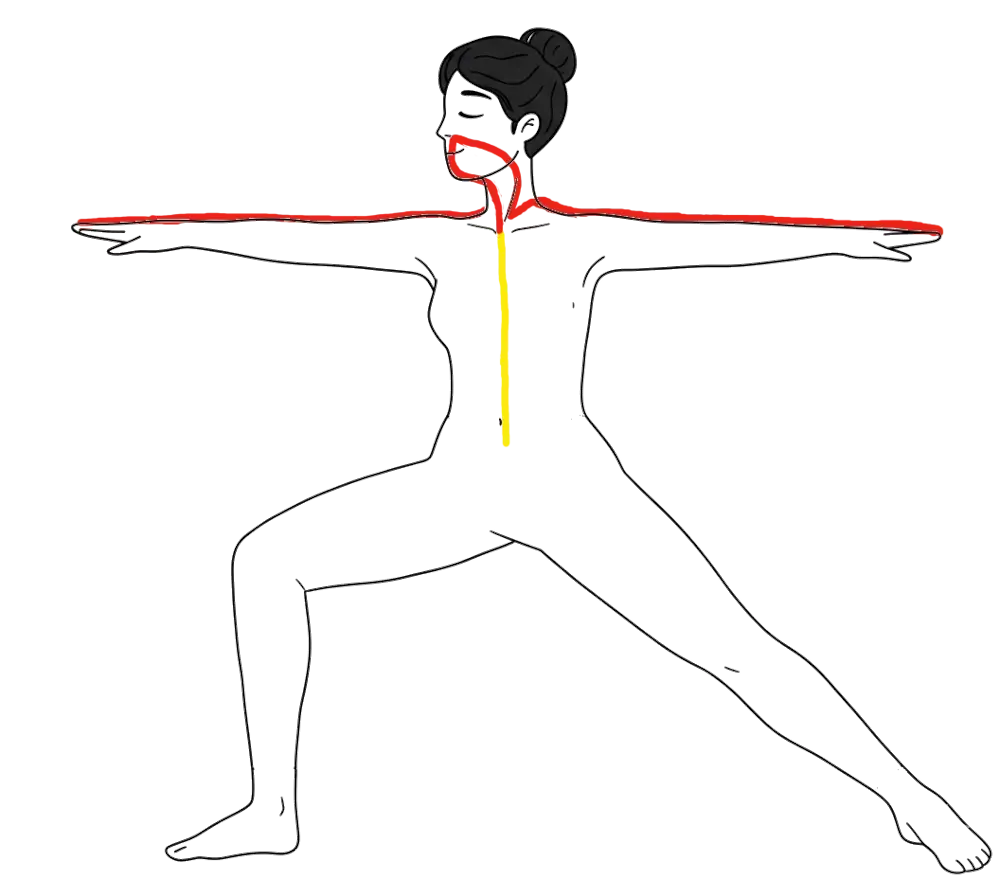LI - Large Intestine Meridian
手阳明大肠经 - Shǒu Yángmíng Dàcháng Jīng
The Large Intestine Meridian governs elimination and letting go on both physical and emotional levels. Known as the "Minister of Transportation," it works closely with the Lung meridian to regulate the body's boundaries and waste elimination. This Yang meridian controls the large intestine, influences the nose and sense of smell, and plays a crucial role in immune function and the body's ability to release what no longer serves.
Emotionally, it governs our capacity to "let go" - whether of physical waste, toxic emotions, or outdated beliefs. It embodies the wisdom to discern what to keep and what to release, essential for both detoxification and emotional cleansing.
Meridian Pathway & Flow
Direction
Flows from hand to head, moving from Yang to Yang
Pathway
- Origin: Begins at LI-1 (Shangyang) at the corner of the index fingernail
- Hand & Arm: Travels along the radial side of the index finger and up the lateral arm
- Shoulder: Ascends over the shoulder to the neck
- Face Path: Terminates at LI-20 (Yingxiang) beside the nose
- Internal Branch: Connects internally to the large intestine and lungs
- Connection: Links to the Stomach meridian at ST-1 near the eye
Active Time
5:00 AM - 7:00 AM (Peak energy circulation)

Primary Functions
Physical Functions
- Controls elimination and bowel function
- Governs the nose and sense of smell
- Regulates immune system boundaries
- Manages skin health and healing
- Supports shoulder and arm function
- Influences teeth and gums
Emotional & Mental Functions
- Governs the ability to let go
- Supports emotional boundaries
- Manages perfectionism and control
- Supports mental clarity and focus
- Processes grief and loss
- Maintains healthy detachment
Essential Acupoints
Select a point to learn about its location, primary functions, clinical applications, and protocols.
Therapeutic Applications
Digestive Issues
- Constipation and elimination problems
- Abdominal pain and bloating
- Inflammatory bowel conditions
- Food sensitivities and allergies
- Detoxification support
Respiratory & Sinus Problems
- Nasal congestion and sinusitis
- Loss of smell (anosmia)
- Allergic rhinitis
- Facial pain and headaches
- Throat dryness and irritation
Emotional & Mental Patterns
- Difficulty letting go and attachment
- Perfectionism and control issues
- Emotional constipation or blockages
- Inability to set boundaries
- Mental rigidity and stubbornness
LI Protocols
Morning Elimination Routine (5-10 minutes, 5-7 AM)
- Begin during LI's peak time (5-7 AM) to support natural elimination
- Drink warm water with lemon or flaxseed to stimulate digestion
- Apply pressure to LI-4 (Hegu) and LI-11 (Quchi) to promote detoxification and bowel movement
- Add LI-10 (Shousanli) for tonifying Qi and easing abdominal tension
- End with gentle pressure on LI-20 (Yingxiang) to clear nasal passages and awaken the senses
Digestive Support Sequence (3-5 minutes)
- Apply firm circular pressure to LI-4 and LI-11
- Add LI-2 (Erjian) and LI-3 (Sanjian) for fluid regulation and clearing heat
- Combine with abdominal breathing and gentle torso twists
All LI Points
Select a point to learn about its location, primary functions, clinical applications, and protocols.
Considerations
Seasonal Focus
- The large intestine meridian is also most active in autumn—support letting go and decluttering during this season
Dietary Support
- Fiber-rich foods (sweet potatoes, oats, flaxseed) aid elimination and support colon health
Environmental
- Practice in calm, orderly spaces; visual clutter can mirror internal stagnation
Exercise
- Combine with brisk walking, stretching, or yoga twists to stimulate peristalsis and release tension
Emotional Work
- Support emotional release by journaling, decluttering, or setting healthy boundaries
Daily Rhythm
- The large intestine is most active between 5-7 AM — support regular elimination with morning routines
Precautions
Pressure
- Use moderate pressure on hand and arm points; avoid overstimulation near joints
Hydration
- Ensure adequate hydration to support healthy bowel movements and detoxification
Skin Health
- LI points may influence skin clarity—observe changes in complexion during regular practice
Acute Symptoms
- For severe abdominal pain or persistent constipation, consult a medical professional
Chronic Conditions
- Coordinate with healthcare providers for IBS, Crohn's, or other digestive disorders
Emotional Processing
- Working with LI points may bring up issues around control, rigidity, or difficulty letting go